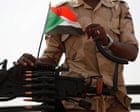
The world stage is currently marked by significant events unfolding in the Middle East and North Africa, causing ripples of concern and prompting discussions among global leaders. As these regions grapple with rising tensions and humanitarian crises, the international community seeks paths to peace and stability. Let us explore the events and their implications with a mindful approach, acknowledging the complexity and challenges while focusing on the potential for resolution.
In Sudan, the recent attack on al-Mujlad hospital in West Kordofan highlights the country’s ongoing civil unrest. The World Health Organization (WHO) reports that this tragic incident resulted in over 40 civilian casualties, including six children and five health workers. This unfortunate event underscores the severe humanitarian crisis in Sudan, one of the world’s largest, as conflict between the Sudanese military and the Rapid Support Forces continues.
Meanwhile, in the Middle East, a fragile truce between Israel and Iran appears to be holding, bringing a momentary pause to hostilities. The ceasefire was facilitated by diplomatic interventions, including a direct call from former U.S. President Donald Trump to Israeli Prime Minister Benjamin Netanyahu, urging a de-escalation of Israeli airstrikes. The truce came amidst reports of Iran’s nuclear program being significantly impacted by recent strikes, though uncertainties remain regarding the true extent of the damage, especially at the Fordow nuclear site.
The ceasefire is welcomed by many in Israel, despite prior missile strikes that caused damage and loss of life. Residents, embracing a sense of relief, reflect on the ceasefire as an opportunity for sustained peace. Leaders, including British Prime Minister Keir Starmer, have reiterated the importance of maintaining the ceasefire, urging Middle Eastern nations to find creative solutions and engage in negotiations that prioritize peace and stability.
Elsewhere, tensions continue as Iran carried out the execution of three individuals accused of espionage for Israel, illustrating the continued atmosphere of mistrust and conflict in the region. This execution follows a complex backdrop of military exchanges, including the reported casualties resulting from conflicts in Gaza, where the Israeli Defense Forces have engaged in military operations.
These events underscore the intricate dynamics at play in the Middle East and North Africa, where political, military, and humanitarian concerns converge. Yet, within these challenges lies the potential for diplomatic dialogue, cooperation, and a mindful pursuit of peace. By focusing on constructive engagement and peaceful resolutions, there is hope for a future where stability and progress prevail.
As we consider these unfolding stories, it is essential to remember the human impact at their core. The individuals and families affected by these conflicts urge us to adopt a compassionate perspective as we navigate the complexities of international relations. In doing so, we honor their experiences and strive for a world where peace and understanding take precedence over discord.
Source: {link}
